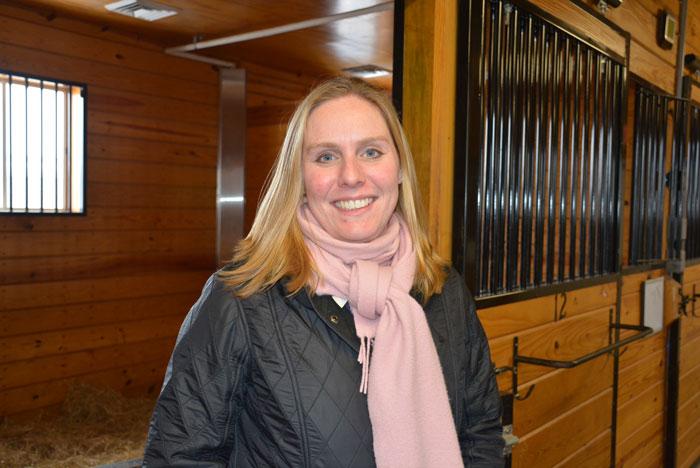Equine Expert

Mary Robinson ’01 combines her love of horses with her passion for medicine
As a director of the Penn Vet Equine Pharmacology Laboratory, Mary Robinson ’01 combines her passion for biomedical research with her love of horses. Read on to see how she bridged her experiences with Dickinson’s Equestrian Club to her career at Penn Vet—and how her broader education helped make her the person she is today.
Can you speak to how Dickinson’s useful liberal-arts education applies to your career?
I am one of the few people who went to college knowing what I wanted to do after graduation: go to veterinary school. Dickinson has an excellent pre-med/[veterinary] curriculum, which not only confirmed my interest in veterinary medicine but extended it to include biomedical research for the purpose of improving both human and animal health. I double-majored in biology and biochemistry & molecular biology and was accepted into the Veterinary Medical Scientist Training Program (VMSTP) at the University of Pennsylvania’s School of Veterinary Medicine in 2001.
The diversity of the liberal-arts curriculum prepared me for my current career and place in this world far better than a non-liberal-arts education. In addition to learning the science I needed to know, I was able to foster and explore my many other interests. It taught me about many cultures of the world and how to interact with people of varied backgrounds and experiences. The ability to communicate with all types of people is something that cannot be underestimated in the global village that we all now occupy.
What jumps out as a great memory from your time
at Dickinson?
Some of my most memorable experiences at Dickinson occurred while taking courses that were electives, which were built into the curriculum to make me a well-rounded person. One of my favorites was [Charles A. Dana Professor of Sociology] Susan Rose’s Political Economy of the Family, which opened my eyes to the family structures and situations of women in other cultures around the world.
Another favorite was [Associate Professor of Religion] Daniel Cozort’s class on yoga theory and practice. The combination of learning about the theory of yoga while also learning how to practice yoga by a certified instructor once a week taught me techniques that I continue to use today.
How did you get interested in your field, and what inspires you in your career?
I became interested in veterinary medicine through my love of horses and all animals. In high school, I worked at a local veterinary clinic and decided that I would pursue pre-vet training in college. At Dickinson I realized I also loved biomedical research, and I sought to marry [my two passions]. I found that the University of Pennsylvania had the only combined degree program for veterinarians on the East Coast, so I applied and was accepted. Toward the end of my training, I was recruited by Penn Vet’s New Bolton Center to train to become a clinical pharmacologist at its large-animal hospital.
I am inspired by the horses themselves. When you have a working relationship with a horse, it is a magical and wonderful gift. It is up to us to ensure their welfare is put first, and that is why I do the work that I do.
What does your work entail?
We perform pharmacological research to provide information regarding how long drugs can be detected in blood and urine samples from horses to determine what concentration in the blood and/or urine correlates with a clinical effect on the horse and to provide information regarding the appropriate use of therapeutic medications.
I am also the acting director of the Pennsylvania Equine Toxicology and Research Laboratory within the Pennsylvania Department of Agriculture, which performs drug testing for the Pennsylvania Horse and Harness Racing Commissions and performs research in analytical chemistry to improve the methods used by the laboratory to detect inappropriate and/or illegal drug use.
What interests you most about your research?
The pharmacology. Many patients (human and animal) end up being on multiple drugs. The question that fascinates me, especially in a race horse competing in athletic competition is, “What is appropriate drug use?”
What is the most challenging part of your career?
Juggling all of the responsibilities! I love the work and my family, and it is in my nature to give 110 percent in everything I do. Maintaining balance (mental, physical and spiritual) is my most difficult challenge. I’ve learned (after many failures) to schedule “thinking time” so that I can properly assess whether I’m spending too much time in one area or another and then adjust as necessary.
What was your favorite organization at Dickinson?
I was intimately involved in the Equestrian Club and served as president during my junior and senior years. I helped to grow the club to a group of about 30 people, and we started the Intercollegiate Horse Show Association Dickinson team. It was a great group, and riding is the passion that led me to pursue veterinary school.
If you could have dinner with anyone, living or dead, who would it be?
My maternal grandmother. She passed away when I was seven years old at the age of 56 from breast cancer. Her battle with cancer inspired me to pursue biomedical research to decrease pain and suffering.
If you could change one thing about your life, what would it be?
Nothing. If I feel a change is needed, I make it happen!
Learn More
- Alumni in Action
- Department of Biology
- Department of Biochemistry & Molecular Biology
- Sport Clubs at Dickinson
- Latest News
Published May 6, 2015